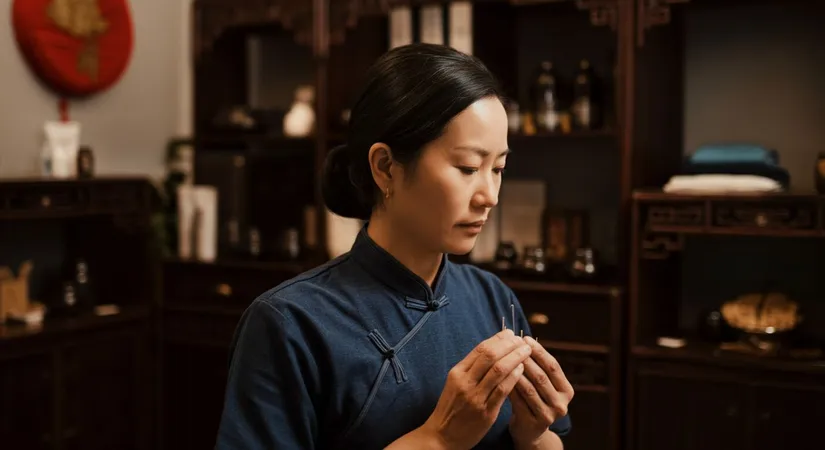Acupuncture: Discovering Holistic Health Benefits
Discover the best Chinese medicine near you to enhance your holistic health. Explore herbal and acupuncture solutions for pain relief and wellness.
In today's fast-paced world, many are turning to Traditional Chinese Medicine (TCM) for its holistic approach to wellness and healing. From balancing one's qi to using ancient herbal remedies, TCM offers diverse methods to enhance your health naturally. Discover how Chinese medicine can address both acute and chronic conditions. If you're searching for trauma-informed practitioners or simply seeking to improve your daily routine, TCM might be the holistic solution you're looking for.
Understanding Traditional Chinese Medicine: A Comprehensive Guide
Foundational Principles of Traditional Chinese Medicine
Traditional Chinese Medicine (TCM) is an ancient healthcare system that emphasizes balance and harmony within the body. Central to TCM are the foundational principles of Yin-Yang theory, the Five Elements, and the concept of qi. These principles guide practitioners in diagnosing and treating various health conditions.Key Concepts in TCM
- Yin-Yang Theory: This principle represents the dual nature of reality, where opposite forces are interconnected and interdependent. For example, Yin is associated with cold and rest, while Yang is linked to heat and activity.
- The Five Elements: Wood, Fire, Earth, Metal, and Water are used to describe interactions and relationships in the body. Each element corresponds to specific organs and emotions, helping practitioners understand imbalances.
- Qi: Often described as life force or energy, qi flows through the body’s meridians. Maintaining a balanced flow of qi is crucial for health, and disruptions can lead to illness.
Applying TCM Principles for Holistic Health
Understanding and applying TCM principles can lead to holistic health improvements. Practitioners use various methods to restore balance, including acupuncture, herbal remedies, and lifestyle changes.- Acupuncture: Involves inserting thin needles into specific points to balance qi flow. It is often used for pain relief and has been shown to reduce chronic pain by up to 50% in some studies.
- Herbal Medicine: Utilizes plant-based substances to treat ailments. For instance, ginseng is used to boost energy and improve mental clarity.
- Dietary and Lifestyle Adjustments: TCM emphasizes the importance of diet and lifestyle in maintaining health. Eating according to the seasons and incorporating mindfulness practices are common recommendations.

How to Find the Best Chinese Herbal Medicine Near You
Evaluating Chinese Herbal Medicine Providers
When searching for quality Chinese herbal medicine, it's essential to evaluate providers carefully. Start by checking if the clinic is accredited and if the practitioners are certified. This ensures they meet professional standards and have the necessary expertise.Researching Herbal Remedies and Their Uses
Understanding the herbs used in Chinese medicine is crucial. Research their benefits, uses, and potential side effects. For example, ginseng is known for boosting energy, while chamomile is often used for relaxation. This knowledge helps in making informed decisions.- Ginseng: Known for enhancing energy and mental clarity.
- Chamomile: Commonly used for its calming effects.
- Ginger: Often used to aid digestion and reduce nausea.
Integrating Chinese and Western Medicine
Combining Chinese herbal medicine with Western treatments can enhance therapeutic effects. For instance, acupuncture alongside conventional pain relief methods has shown improved outcomes in managing chronic pain. This integration requires careful coordination with healthcare providers.- Consult with both TCM and Western practitioners to ensure compatibility.
- Monitor treatment progress and adjust as needed for optimal results.
- Regularly review and update treatment plans based on patient response.

Exploring Acupuncture Clinics Nearby for Pain Relief
Selecting the Right Acupuncture Clinic
Choosing an acupuncture clinic involves several key considerations to ensure safety and effectiveness. First, verify the credentials of practitioners. Licensed acupuncturists have completed rigorous training and adhere to professional standards, which is crucial for effective treatment.Evaluating Clinic Hygiene and Environment
- Ensure the clinic maintains high hygiene standards, such as using sterilized needles and clean treatment areas.
- Observe the clinic's environment for comfort and professionalism, which can enhance the therapeutic experience.
- Check for compliance with local health regulations, ensuring a safe treatment setting.
Understanding the Benefits of Acupuncture
Acupuncture offers a drug-free alternative for pain management, reducing reliance on pharmaceuticals. Studies indicate that acupuncture can decrease chronic pain by up to 50%, making it a viable option for those seeking holistic health solutions.- Consultation: Discuss your health concerns and treatment goals with the practitioner.
- Treatment Plan: Receive a personalized plan tailored to your specific needs and conditions.
- Follow-up: Regularly assess progress and adjust treatments for optimal results.
Herbal Remedies Local: Natural Solutions for Everyday Ailments
Harnessing the Power of Local Herbs
Local herbs offer a sustainable and accessible way to address common health issues. For instance, peppermint, often found in local gardens, can alleviate digestive discomfort. Similarly, lavender, known for its calming properties, can be used to reduce stress and improve sleep quality. These herbs are not only effective but also easy to incorporate into daily routines.- Peppermint: Known for its ability to soothe digestive issues, it can be brewed into a tea for relief.
- Lavender: Often used in aromatherapy, it helps reduce anxiety and promotes restful sleep.
- Echinacea: Commonly used to boost the immune system, especially during cold and flu season.
Preparing Herbal Remedies at Home
Creating herbal remedies at home is both economical and empowering. Start by sourcing fresh or dried herbs from local markets or your garden. For example, a simple herbal infusion can be made by steeping herbs in hot water. This method preserves the beneficial compounds and is easy to prepare.- Choose fresh or dried herbs based on availability and desired effects.
- Steep the herbs in hot water for 5-10 minutes to extract their benefits.
- Strain and enjoy the infusion, adjusting the strength to your preference.
Integrating Traditional Chinese Medicine for Holistic Health
Traditional Chinese Medicine (TCM) employs foundational principles such as Yin-Yang theory and the Five Elements to achieve balance and harmony within the body. These principles guide practitioners in using methods like acupuncture and herbal remedies to restore health naturally.
Practitioners of TCM are trained in diagnosing and treating health conditions by understanding the flow of qi and its impact on the body. Their expertise in herbal medicine and acupuncture provides a comprehensive approach to wellness.
Local Herbal Remedies for Everyday Ailments
Utilizing local herbs like peppermint and lavender offers sustainable solutions for common health issues. These herbs are easy to incorporate into daily routines, providing natural relief for digestive discomfort and stress.
By preparing herbal remedies at home, individuals can manage everyday ailments effectively while embracing natural health practices. This approach empowers individuals to take control of their wellness using accessible resources.
Frequently Asked Questions
How does Traditional Chinese Medicine work?
Traditional Chinese Medicine (TCM) works by focusing on balance and harmony within the body through principles like Yin-Yang theory and the Five Elements. Practitioners use methods such as acupuncture and herbal remedies to restore the flow of qi, which is believed to be essential for health. This holistic approach addresses both physical and emotional well-being.
What is the best Chinese medicine for anxiety?
In Traditional Chinese Medicine, herbs like chamomile and lavender are often used to alleviate anxiety due to their calming properties. Acupuncture is also a popular method for reducing stress and anxiety by balancing qi flow. It's essential to consult with a qualified practitioner to determine the best treatment for your specific needs.
How can I find the best Chinese medicine near me for pain relief?
To find the best Chinese medicine near you for pain relief, start by researching local acupuncture clinics and herbal medicine providers. Check for credentials and certifications to ensure practitioners meet professional standards. Acupuncture is particularly effective for pain management, often reducing chronic pain by up to 50%.
Are there any risks associated with acupuncture clinics nearby?
While acupuncture is generally safe, it's crucial to choose a licensed practitioner to minimize risks. Ensure the clinic follows strict hygiene protocols, such as using sterilized needles. Licensed acupuncturists undergo rigorous training, which helps ensure safe and effective treatments for pain relief and other conditions.
What are some local herbal remedies for everyday ailments?
Local herbal remedies like peppermint and lavender offer natural solutions for common ailments. Peppermint can soothe digestive issues, while lavender is known for its calming effects. These herbs are easy to incorporate into daily routines, providing sustainable and accessible relief for various health concerns.
Discover the Path to 'Healthy Beauty' with estethica's Expert Care!
📞 Call Now for Your Free Consultation!
Fill in the Form
We call you immediately